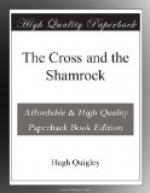“Your ministers think they have great merit,” said the Irish cotters, whose names were Lee and Twohy, “when they succeed in causing a lax Catholic to trample on every precept of his religion and to perjure himself; but as God is just, and as those who counsel to evil partake of its guilt, and will have to suffer its punishment, so will all the sins that your minister’s cruel advice led us to commit be laid to his charge before the just tribunal of Christ.”
After this speech, the two Irish Catholic cotters retired from the meeting, and ever since these two men have proved, by their repentance, zeal, humility, and perseverance, that, though they fell from the external practice of their faith, they did so influenced by the evil advice and misrepresentations of persons who took advantage of their inexperience and poverty to lead them astray. They were gradually, however, becoming reconciled to the hard life of hypocrisy and sin which they were induced to enter on, and might have forever continued in the reprobate path on which, in an evil hour, they walked, had not the cruel martyrdom of the holy orphan child aroused them from their slumbers. Thus, as of old, does the “blood of martyrs become the seed of new Christians;” and thus is Erin, even in America, still true to her Heaven-appointed destiny—which is, that of being a missionary and a martyr in the new world as well as in the old.
CHAPTER XXI.
“Considerate, et videte si est dolor
sicut dolor meus.”
“Attend, and see if there be any
sorrow like to my sorrow.”
LAM. JER.
There was a complete suspension of the ordinary occupations on the farm of Gulvert for near ten days, owing to the trials with which his family was visited. The wife was still confined to her room, and continually threatening her husband with the divorce, who, on his part, had no heart to conduct the necessary work of his farm, he felt so dispirited at the loss of his team and of the money out of which “his converts” had tricked him. Add to this that there were very ugly rumors going the round of the neighborhood in reference to the ill usage the little Irish orphan met with. While he was living and in suffering, there was nobody to sympathize with him or to say a word in his favor; but now, when that sympathy could do him no good, according to the custom of modern philanthropy, there was an abundance on hand, and the conduct of Shaw Gulvert, as the agent of Parson Waistcoat, was censured by a thousand tongues. This is characteristic of Protestant charity: when one is dying of hunger, or forced to beg a crum of bread, she shuts her ears, and points to the prison or poorhouse, as the only proper retreat for whoever is compelled to commit the sin of mendicity; but no sooner does the victim of her own neglect or misdirected benevolence die, no sooner is he out of the reach of all human relief, than the heralds of Protestant charity gather round his tomb, to proffer their assistance, aid, and liberality—like the Jews building the tombs of the prophets put to death by their own malice.




